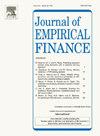What drives robo-advice?
IF 2.4
2区 经济学
Q2 BUSINESS, FINANCE
引用次数: 0
Abstract
The promise of robo-advisory firms is to provide low-cost access to diversified portfolios built according to academic literature on normative portfolio choice. We investigate the extent to which robo-advice aligns with normative advice. Using web-scraped portfolio recommendations for 151,200 investor types from a major US robo-advisor, we find that investment goals and time horizons significantly influence recommended equity allocations, while Merton-type hedging demands are largely ignored. Our results suggest that commercial robo-advisors prioritize simplicity and client perceptions over complex, normative models. By integrating data from the NFCS survey, we further explore how demographic factors influence the likelihood of using robo-advisory services. This study provides empirical evidence on how closely robo-advisory services align with normative portfolio theory, highlighting the practical compromises made in the pursuit of broad market appeal and user-friendly solutions.
是什么驱动了机器人的建议?
机器人咨询公司的承诺是提供低成本的多元化投资组合,这些投资组合是根据规范投资组合选择的学术文献建立的。我们调查了机器人建议与规范建议一致的程度。通过对美国一家大型机器人顾问提供的151,200种投资者类型的网上投资组合推荐,我们发现投资目标和时间范围显著影响了推荐的股票配置,而默顿型对冲需求在很大程度上被忽略了。我们的研究结果表明,商业机器人顾问优先考虑简单性和客户感知,而不是复杂的规范模型。通过整合来自NFCS调查的数据,我们进一步探讨了人口因素如何影响使用机器人咨询服务的可能性。本研究提供了关于机器人咨询服务与规范投资组合理论紧密结合的实证证据,突出了在追求广泛市场吸引力和用户友好解决方案时做出的实际妥协。
本文章由计算机程序翻译,如有差异,请以英文原文为准。
求助全文
约1分钟内获得全文
求助全文
来源期刊

Journal of Empirical Finance
Multiple-
CiteScore
3.40
自引率
3.80%
发文量
59
期刊介绍:
The Journal of Empirical Finance is a financial economics journal whose aim is to publish high quality articles in empirical finance. Empirical finance is interpreted broadly to include any type of empirical work in financial economics, financial econometrics, and also theoretical work with clear empirical implications, even when there is no empirical analysis. The Journal welcomes articles in all fields of finance, such as asset pricing, corporate finance, financial econometrics, banking, international finance, microstructure, behavioural finance, etc. The Editorial Team is willing to take risks on innovative research, controversial papers, and unusual approaches. We are also particularly interested in work produced by young scholars. The composition of the editorial board reflects such goals.
 求助内容:
求助内容: 应助结果提醒方式:
应助结果提醒方式:


